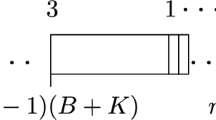Abstract
We examine the problem of sequencing a set of jobs on a single machine, where each job has a random processing time and is associated with a known, job-dependent weight. The objective is to minimize the expectation of the weighted variance of job completion times. We establish the NP-completeness of this problem, and further show that the problem under some compatible conditions is NP-complete in the ordinary sense. We introduce the concept of a W-shaped solution for the problem and find that an optimal W-shaped sequence exists under the compatible conditions. We propose an exact algorithm, based on this W-shaped property, which can generate an optimal solution in pseudopolynomial time.
Similar content being viewed by others
References
K.R. Baker and G.D. Scudder, Sequencing with earliness and tardiness penalties: A review, Operations Research 38(1990)22–36.
X. Cai, Minimization of agreeably weighted variance in single machine systems, European Journal of Operational Research 85(1995)576–592.
X. Cai, V-Shape property for job sequences that minimize the expected completion time variance, European Journal of Operational Research 91(1996)118–123.
T.C.E. Cheng and M. Gupta, Survey of scheduling research involving due date determination decisions, European Journal of Operational Research 38(1989)156–166.
P. De, J.B. Ghosh and C.E. Wells, On the minimization of completion time variance with a bicriteria extension, Operations Research 40(1992)1148–1155.
S. Eilon and I.G. Chowdhury, Minimizing waiting time variance in the single machine problem, Management Science 23(1977)567–575.
M.R. Garey, R.E. Tarjan and G.T. Wilfong, One-processor scheduling with symmetric earliness and tardiness penalty, Mathematics of Operations Research 13(1988)330–348.
M.C. Gupta, Y.P. Gupta and A. Kumar, Minimizing flow time variance in a single machine system using genetic algorithms, European Journal of Operational Research 70(1993)289–303.
N. Hall and W. Kubiak, Proof of the conjecture of Schrage about the completion time variance problem, Operations Research Letters 10(1991)467–473.
N. Hall and M.E. Posner, Earliness-tardiness scheduling problems, I: Weighted deviation of completion times about a common due date, Operations Research 39(1991)836–846.
N. Hall, W. Kubiak and S.P. Sethi, Earliness-tardiness scheduling problems, II: Deviation of completion times about a restrictive common due date, Operations Research 39(1991)847–856.
G.H. Hardy, J.E. Littlewood and G. Polya, Inequalities, Cambridge University Press, London, 1934.
J.J. Kanet, Minimizing variation of flow time in single machine systems, Management Science 27(1981)1453–1459.
H. Kise, T. Ibaraki and H. Mine, A solvable case of the one-machine scheduling problem with ready and due times, Operations Research 26(1978)121–126.
W. Kubiak, Completion time variance on a single machine is difficult, Operations Research Letters 12(1993)49–59.
E.L. Lawler, Sequencing to minimize the weighted number of tardy jobs, Rev. Automat. Informat. Rec. Opnl. 10(1976)27–33.
E.L. Lawler, A pseudopolynomial algorithm for sequencing jobs to minimize total tardiness, Annals of Discrete Mathematics 1(1977)331–342.
C.-Y. Lee, S.L. Danusaputro and C.-S. Lin, Minimizing weighted number of tardy jobs and weighted earliness-tardiness penalties about a common due date, Computers and Operations Research 18(1991)379–389.
A.G. Merten and M.E. Muller, Variance minimization in single machine sequencing problems, Management Science 18(1972)518–528.
J. Mittenthal and M. Raghavachari, Stochastic single machine scheduling with quadratic early-tardy penalties, Operations Research 41(1993)786–796.
M. Pinedo, Stochastic scheduling with release dates and due dates, Operations Research 31(1983) 559–572.
L. Schrage, Minimizing the time-in-system variance for a finite jobset, Management Science 21 (1975)540–543.
V. Vani and M. Raghavachari, Deterministic and random single machine sequencing with variance minimization, Operations Research 35(1987)111–120.
S. Zhou and X. Cai, Variance minimization — relationship between completion time variance and waiting time variance, Journal of Australian Mathematical Society, Series B 38(1996)126–139.
Rights and permissions
About this article
Cite this article
Cai, X., Zhou, S. Sequencing jobs with random processing times to minimize weighted completion time variance. Annals of Operations Research 70, 241–260 (1997). https://doi.org/10.1023/A:1018926305578
Issue Date:
DOI: https://doi.org/10.1023/A:1018926305578




